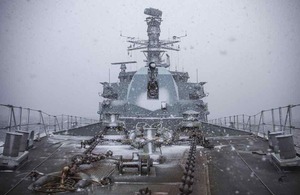The Royal Navy leads an international task group of warships on a security patrol of the Baltic
Royal Navy frigates led vessels from all three Baltic states in the first operation of the UK-led Joint Expeditionary Force.

The weather in the Baltic - including snow squalls – poses demanding conditions for crew to navigate
Frigates HMS Lancaster and Westminster, tanker RFA Tiderace and vessels from all three Baltic states – Latvia, Lithuania and Estonia – have joined forces for a concerted demonstration of Britain’s commitment to the security and stability of the region.
It is the first operation of the UK-led Joint Expeditionary Force – a partnership of nine northern European nations committed to working together on operations as varied as warfighting through to humanitarian assistance and defence engagement.
In this instance, the expeditionary force is focusing on maritime security in the southern Baltic Sea.
The Royal Navy ships have been joined by Estonian minehunter Wambola, Latvian patrol vessel Jelgava, and from Lithuania minehunter Jotvingis and patrol ship Selis.
Defence Secretary Ben Wallace said:
Some of the UK’s closest and most steadfast Allies are found in the Baltics. This deployment is both the latest example of a long and proud history of defence cooperation and a clear demonstration of the capability of the UK-led Joint Expeditionary Force (JEF).
As the first maritime patrol of made up of exclusively JEF nations, we are ensuring our ships and people are ready to operate in challenging conditions alongside our Estonian, Latvian and Lithuanian allies.
Commander Will Blackett, Commanding Officer of HMS Lancaster:
It is a real privilege to command the first task group of this type and I have been impressed by the capabilities on display from our partner nations.
My ship’s company are continuing to deliver success on operations against the hugely challenging backdrop of the Coronavirus pandemic.
His ships conducted a series of combined manoeuvres to test collective seamanship and get used to working together as a united task group, all played out in unrelenting sub-zero temperatures.
HMS Lancaster warfare specialist Able Seaman James Hearn said:
It is hugely exciting to be working with allied navies on live operations and a real privilege for me to experience.
Lancaster’s Wildcat helicopter is flying patrols by day and night, in particular making use of its cutting-edge thermal imaging camera to refine identifying shipping in the Baltic, as well as practising secondary duties such as search and rescue and winching.
The weather in the Baltic in March - glorious sunshine one minute and a few hours later the aircraft is flying through snow squalls – is placing demands on the aircrew as well as the engineers maintaining the helicopter.
The British ships underwent a week of ‘full-throttle’ individual and combined training in the North Sea on their way to join their Baltic allies.
The workout has covered firefighting, medical training, damage control, ships sailing in close formation, refuelling at sea, gunnery, air defence, and intensive training with helicopters – plus adjusting to sub-zero temperatures and snowstorms as the ships pushed deeper into the Baltic.
Updates to this page
-
Paragraph 1 has been edited to clarify the make-up of the international task group.
-
First published.